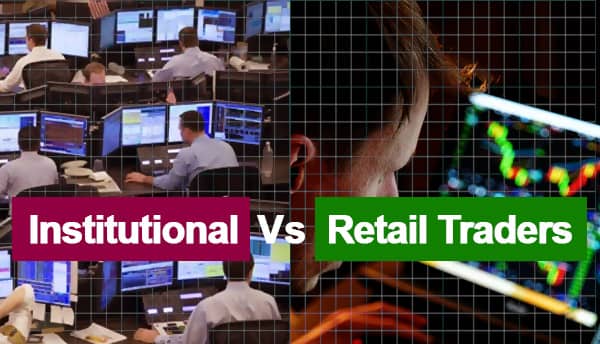Institutional Traders vs. Retail Traders: An Overview
Trading securities can be as simple as pressing the buy or sell button on an electronic trading account. More sophisticated traders, however, may opt for more complex trades by setting a limit price on a block trade that is parsed over many brokers and traded over several days. The differences lie in the type of trader, and there are two basic types: retail and institutional.
Retail traders, often referred to as individual traders, buy or sell securities for personal accounts. Institutional traders buy and sell securities for accounts they manage for a group or institution. Pension funds, mutual fund families, insurance companies, and exchange traded funds (ETFs) are common institutional traders.
Several of the advantages institutional traders once enjoyed over retail investors have dissipated. The accessibility of sophisticated online brokerages, the ability to trade in and receive more diverse securities (such as options), real-time data, and the widespread availability of investment data and analysis have narrowed the gap.
The gap has not completely closed, though. Institutions still have numerous advantages, such as access to more securities (IPOs, futures, swaps), the ability to negotiate trading fees, and the guarantee of best price and execution.
KEY TAKEAWAYS
- Institutional traders buy and sell securities for accounts they manage for a group or institution.
- Retail traders buy or sell securities for personal accounts.
- Institutional traders usually trade larger sizes and can trade more exotic products.
- Online brokerages and other factors have narrowed the gap between institutional and retail traders, which once gave institutional traders an advantage.
Institutional Traders
Institutional traders have the ability to invest in securities that generally are not available to retail traders, such as forwards and swaps. The complex nature and types of transactions typically discourage or prohibit individual traders. Also, institutional traders often are solicited for investments in IPOs.
Institutional traders usually trade blocks of at least 10,000 shares and can minimize costs by sending trades through to the exchanges independently or through an intermediary.
Institutional traders negotiate basis point fees for each transaction and require the best price and execution. They are not charged marketing or distribution expense ratios.
Because of the large volume, institutional traders can greatly impact the share price of a security. For this reason, they sometimes may split trades among various brokers or over time in order to not make a material impact.
The larger the institutional fund, the higher the market cap institutional traders tend to own. It is more difficult to put a lot of cash to work in smaller-cap stocks because the traders may not want to be majority owners or decrease liquidity to the point where there may be no one to take the other side of the trade.
Retail Traders
Retail traders typically invest in stocks, bonds, options, and futures, and they have minimal to no access to IPOs. Most trades are made in round lots (100 shares), but retail traders can trade any amount of shares at a time.
The cost to make trades might be higher for retail traders if they go through a broker that charges a flat fee per trade in addition to marketing and distribution costs. The number of shares traded by retail traders usually is too few to impact the price of the security.
Unlike institutional traders, retail traders are more likely to invest in small-cap stocks because they can have lower price points, allowing them to buy many different securities in an adequate number of shares to achieve a diversified portfolio.
Special Considerations
Though retail traders and institutional traders are different breeds of traders, retail traders often become institutional traders. A retail trader may start to trade for their own personal account, and if they perform well, they may start to trade for friends and family.
If a retail trader continues to generate positive returns and accumulate more capital from other investors, they may organize into what is essentially a small investment fund. This growth can continue, limitless, to the point where the retail trader is now an institutional trader.




